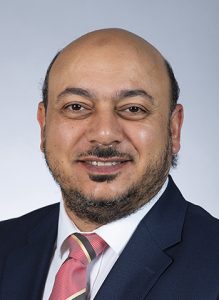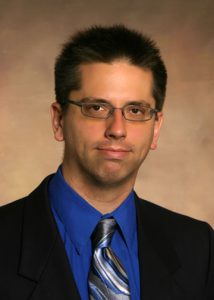Abdelkhalik, Holland receive faculty promotions
Author: John Burnett-Larkins
Author: John Burnett-Larkins

Abdelkhalik joined the Department of Aerospace Engineering faculty in 2018 as an associate professor. Prior to coming to Iowa State he was an associate professor at Michigan Technological University. Abdelkhalik received a Ph.D. in aerospace engineering from Texas A&M University and received his B.S. and M.S. at University of Cairo, Egypt.
He is the author of numerous journal and conference papers and holds numerous patents. He is an associate fellow of the American Institute of Aerodynamics and Astrodynamics (AIAA), an associate editor of the AIAA Journal of Spacecraft and Rockets, an associate editor of the Springer Journal of Astrodynamics, and an associate editor of the IEEE Transactions on Sustainable Energy. His professional society involvement includes AIAA, ASME, IEEE and the American Astronomical Society (AAS), where he is a member of the AIAA Technical Committee on Astrodynamics and conference general chair for the AAS/AIAA Space Flight Mechanics Meeting in 2014 and the AAS/AIAA Astrodynamics Specialist Conference in 2022.
Abdelkhalik’s areas of research expertise include dynamics, control, systems architecture optimization, astrodynamics, spacecraft control, and ocean wave energy conversion.

Holland holds a Ph.D. in theoretical and applied mechanics and a B.S. in electrical engineering from Cornell University. He began work for the ISU Center for Nondestructive Evaluation as a postdoctoral research associate in 2002. He became an assistant professor in the Department of Aerospace Engineering in 2006.
In 2021 he was selected as a Fellow in the American Society for Nondestructive Testing (ASNT), one of only four individuals nationally selected for the honor that year. He has made significant contributions to multiple aerospace and NDE research and teaching innovations, especially in the area of vibrothermographic nondestructive testing.
He leads research programs on the forefront of thermal nondestructive evaluation and data integration, all with an aim of making new NDE methods practical for industrial applications. Holland is a pioneer in the area of using computational physical modeling of measurement processes to aid in data interpretation and using “digital twins” for managing NDE data. On this and other work, he’s published 39 refereed journal articles, conference proceedings and book chapters, along with another 48 other conference proceedings. Holland often makes his tools and algorithms available as open-source software, further extending the reach of his research.